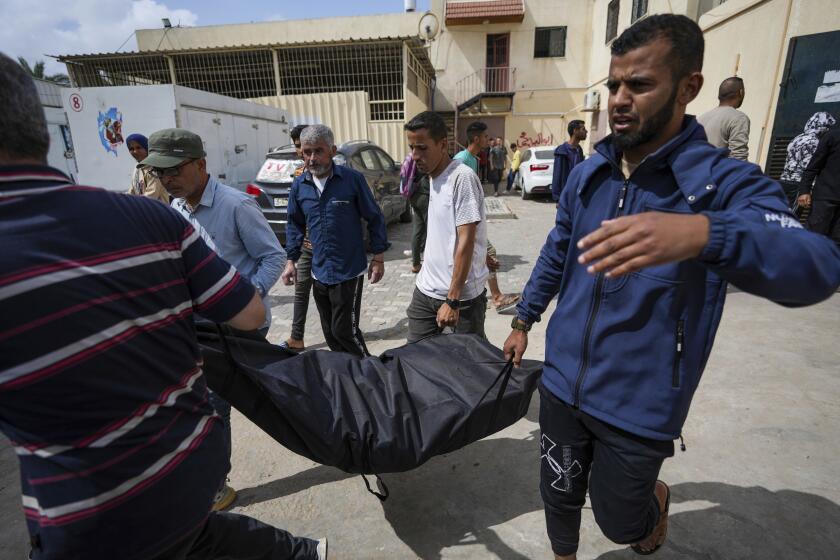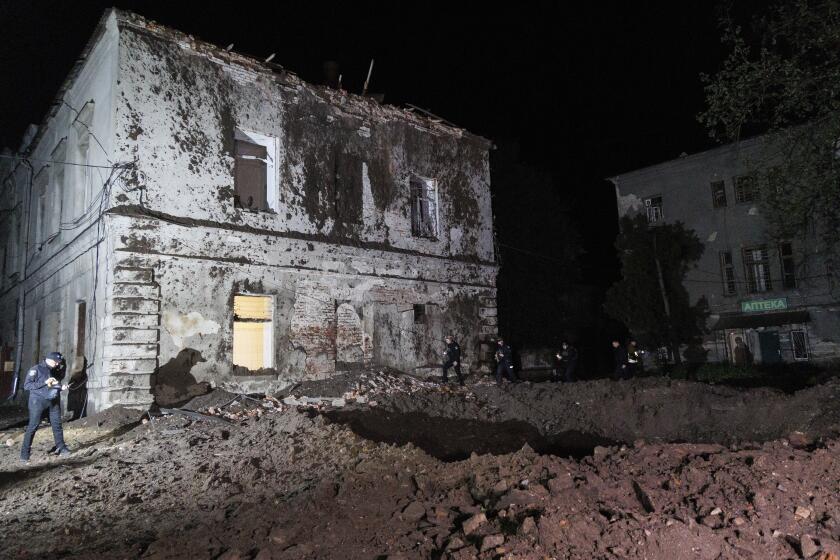Outgoing envoy has a warning for Iraqis
With a final wave, departing U.S. Ambassador Zalmay Khalilzad boarded a U.S. military helicopter and flew out of Baghdad on Monday, warning Iraqi leaders that they risk losing the support of impatient U.S. voters if they don’t “step up” and make the tough decisions necessary to bring peace to the strife-torn nation.
At a news conference in the fortified Green Zone, Khalilzad said Iraqi leaders had taken important steps toward overcoming their sectarian differences, including approving draft legislation on sharing Iraq’s massive oil wealth. But with pressure mounting in Washington to set a timetable for U.S. withdrawal, he said, Iraqis need to act quickly to stabilize the country.
“I know that we are an impatient people,” Khalilzad said. “I constantly signal to the Iraqi leaders that our patience, or the patience of the American people, is running out.”
It was a stark warning from an envoy who was a strong supporter of the U.S.-led invasion in 2003 and who maintains that peace, prosperity and democracy can be achieved.
“This idea has been practiced rarely in this region, and some people believe it’s unrealistic,” Khalilzad said at a farewell luncheon Sunday held by Prime Minister Nouri Maliki. “As a son of this region, I have felt insulted by those who have argued this way. I believe that Iraq will succeed.”
True to his reputation as a tireless worker, Khalilzad was still going over documents as he sat in the Black Hawk helicopter waiting to take off Monday night. He then turned and waved a last time to a small group of senior staffers there to see him off at a helipad near the U.S. Embassy.
Khalilzad will be replaced within days by Ryan Crocker, a career diplomat who last served as ambassador to Pakistan.
Khalilzad, President Bush’s nominee as U.S. ambassador to the United Nations, arrived in Iraq in June 2005, determined to reverse the slide toward civil war. He leaves behind a country awash in bloodshed.
Sectarian killing and insurgent attacks increased, especially in the capital, after the bombing of a revered Shiite Muslim shrine in Samarra in February 2006. Tens of thousands of Iraqis have been killed in fighting between Sunni Arab and Shiite militants. At least 28 were found slain Monday in Baghdad and other parts of the country.
Meanwhile, the number of U.S. casualties has doubled during Khalilzad’s tenure, reaching at least 3,242, according to icasualties.org, a website that tracks military casualties in Iraq.
“I have been very saddened and concerned that the level of violence has been as high,” Khalilzad said on a last swing Thursday to the largely peaceful Kurdish region in the north. “Sectarian violence in particular has been a great threat.”
Khalilzad spent much of his 21 months in Iraq trying to woo the disaffected Sunni Arab community that dominated under Saddam Hussein into the political process, hoping to undercut support for insurgents fighting U.S. forces and those who cooperate with them.
Through endless meetings, and over countless cups of tea, Khalilzad hammered out a deal on a new constitution, including a provision allowing revision of sections that infuriated Sunni Arab politicians.
He is also credited with persuading the embittered minority to participate in the country’s first full-term elections in December 2005 and cajoling all sides into what was termed a unity government. Khalilzad told reporters Monday that his negotiations extended to representatives of Sunni Arab insurgent groups he hoped could be persuaded to form a united front with the government to fight Al Qaeda in Iraq.
Although many Iraqi politicians praised Khalilzad’s efforts, some analysts said he became too involved in the internal workings of Iraq’s government.
“Such activity has served to increase Iraqi government dependence on the U.S., reinforce the impression that Washington is still really running things in Iraq and increase U.S. responsibility for resultant failures -- all without really changing decisively the overall picture on the ground in any way for the better,” said Wayne White of the Washington-based Middle East Institute.
In the process, Khalilzad also antagonized many in the governing Shiite bloc, including Maliki. “We felt at one stage, to be honest with you, that probably he had his distance from the Shiite groups as [opposed to] the Sunni groups,” said Haider Abadi, a senior member of Maliki’s Islamic Dawa Party.
Many felt Khalilzad, a Sunni born in Afghanistan, was putting too much emphasis on dismantling Shiite militias accused of nightly killing sprees in Sunni Arab neighborhoods, without adequately considering the bombings and other attacks unleashed by Sunni insurgents against Shiites.
“That in turn led to a backlash from Shiite militias,” Abadi said.
Some Shiite leaders started referring to Khalilzad as “Abu Omar,” a stereotypical Sunni nickname.
Sunni Arab and Kurdish leaders had a warmer relationship with the energetic U.S. envoy, who was frequently seen fingering prayer beads as he dashed from one meeting to the next.
“He had the personality to mix with all the different parties,” said Saleh Mutlak, a Sunni lawmaker. “But he didn’t manage to solve Iraq’s problems before he left. He didn’t take enough risks.”
Joost Hiltermann, Middle East director for the International Crisis Group, questioned whether any U.S. envoy could have succeeded.
“The significant change has to come from Washington, and I don’t see this administration capable of acknowledging that things have gone drastically wrong and need to be radically overhauled,” he said.
Khalilzad acknowledged Monday that much remained to be done. He urged Iraq’s leaders to move quickly to disband paramilitary groups, set a date for local elections and make the constitutional changes needed to make the document acceptable to all ethnic and religious groups.
In a sign of progress, Maliki and President Jalal Talabani, a Kurd, announced that they would send a bill to the Cabinet as early as today to allow former members of Hussein’s Baath Party to rejoin the civil service and military. The bill would bar only those at the highest levels of the former regime from participating and would provide them a modest pension, addressing a key Sunni grievance.
Ultimately, however, success will depend on Iraqis themselves, said Mahmoud Othman, an independent Kurdish lawmaker. “If they don’t get together willingly, nobody can impose that on them,” he said.
*
Times staff writers Raheem Salman and Ned Parker in Baghdad and special correspondents in Baghdad, Hillah, Kirkuk and Mosul contributed to this report.
More to Read
Start your day right
Sign up for Essential California for news, features and recommendations from the L.A. Times and beyond in your inbox six days a week.
You may occasionally receive promotional content from the Los Angeles Times.






